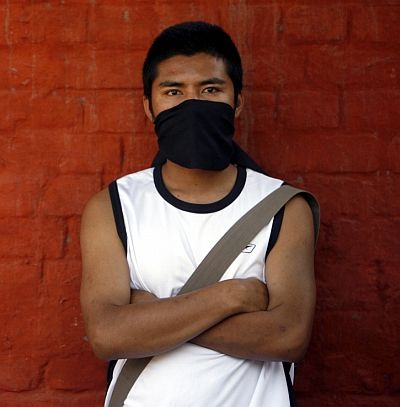 'Where does one draw the line? At what point does your right to free speech cross the limit of civilised discourse and provoke me to take offence?'
'Where does one draw the line? At what point does your right to free speech cross the limit of civilised discourse and provoke me to take offence?'
'And if you have the right to offend, what about someone else's right to be offended?' asks Hasan Suroor.
After the Charlie Hebdo massacre, as the media buzzed with self-righteous assertions about free speech, it was left to a British Jewish schoolgirl to pose a simple, albeit vital, question: 'I know the cartoonists were very brave, but what about the poor Jewish victims in the supermarket (taken hostage by an accomplice of the Charlie Hebdo killers)? Weren't they also dying for what they believed in? People hardly mention them.'
Over the past two weeks, millions of words have been written about the rights and wrongs of publishing the Prophet's cartoons. Was it simply about free speech? Or did it have a whiff of Islamophobia?
While challenging Muslim intolerance, wasn't Charlie Hebdo, too, exhibiting a certain type of intolerance?
An intolerance of a faith group's sacred belief in the name of absolute right to free expression? And what about the lives of other innocent people that it was putting at risk, as the young schoolgirl asked, by deliberately provoking murderous fanatics?
People have answered these questions depending on where they come from, with the debate polarised between those who believe in absolute freedom of speech and those who wish to destroy the notion of free speech altogether. Moderate voices, caught up between these two noisy competing narratives, are struggling to be heard. So, let's hear for them.
Professor Mahmood Mamdani of Columbia University and author of Good Muslim, Bad Muslim, is one of them. And he has this to say: 'I support the right of free speech as part of a right of dissent. But that does not mean that I support every particular exercise of free speech or dissent. It is well-known that the history of free speech is contradictory. We recognise it by distinguishing "hate speech" from other forms of free speech. Some States ban "hate speech" legally, other States refrain from a legal ban and leave it to society to discourage it politically and morally.' (The Hindu, January 16, 2015).
And that's the nub of the issue. Where does one draw the line? At what point does your right to free speech cross the limit of civilised discourse and provoke me to take offence?
And if you have the right to offend, what about someone else's right to be offended?
The fact is that, for all the hand-wringing, it is not too difficult to judge where this invisible line lies, as the Pope vividly and rather forcefully illustrated with a simple example.
Pointing towards a friend standing next to him, he said: 'It is true you should not react violently (as the Charlie Hebdo killers did) but although we are good friends if he says a curse word against my mother, he can expect a punch, it's normal.'
An eminent American jurist, Oliver Wendell Holmes Jr, famously said: 'Your right to swing your fist ends where my nose begins.' (Variations of this quote are credited to several others, including John Stuart Mill and Abraham Lincoln.)
Ultimately it boils down to civilised behaviour. And in fact, in our daily lives, we are doing it all the time -- making sure not to offend others and constantly saying sorry and apologising for causing hurt.
In his memoirs Anton Joseph, Salman Rushdie proudly recalls apologising to a woman friend who rightly took offence when he told her to '***k off.' Yet he refused to say sorry to millions of Muslims who felt genuinely offended by what they regarded as his 'insulting' references to their most revered religious figure.
Why is it that in our normal daily interaction we are so careful to avoid deliberate offence, but insist so vehemently on our right to offend when it comes to the printed word or any other form of 'creative' expression?
Ah, that -- we're told -- is because literary expression is about exploring ideas, questioning dogma and breaking taboos. But many even in the West -- the Mecca of the idea of absolute free speech -- have started to wonder whether this rationale is not really a catch-all pretext for being gratuitously offensive.
What is so intellectually or philosophically challenging about drawing the Prophet's cartoons or caricaturing him except to take the mickey out of a group of people you don't like? Mock their beliefs because you think they are irrational. It is not even original or funny anymore.
As the Marxist British writer Tariq Ali, a strong critic of Muslim fundamentalism himself, said, such lampooning is nothing but 'bigotry.'
One Catholic British student said she didn't find anything 'funny' in the Charlie Hebdo cartoons.
'They're offensive. I wouldn't want sexist or racist or homophobic cartoons either. I don't know why anyone else would. It feels like we are picking on Muslims.'
Much has been made of the French values of freedom, liberty, and a particularly fundamentalist kind of secularism. And Charlie Hebdo's own history of irreverence and satire, not sparing any 'holy cow' including the Pope, has been cited to justify the Prophet's cartoons.
Yet, as commentators have pointed out, the same France banned the magazine known in its previous incarnation as Hara Kiri -- for mocking Charles de Gaulle's death. It then reinvented itself as Charlie Hebdo.
And for all its famed irreverence the magazine doesn't do anti-semitism.
Again, France is among the several European countries where Holocaust denial and anti-semitism are criminal offences.
It is important for the health of free speech itself that it is not allowed to become a pretext for bigotry. And in a civilised society people ought to know where to draw the line.
The line is where what you do or say lurches into inciting hatred; and many countries such as Britain have laws against it while others, as Professor Mamdani points out, leave it to society to discourage it 'politically and morally.' It is all about negotiating compromises in the larger interest of societal harmony.
The notion that one-cap-fits-all -- namely that a certain idea of free speech or democracy must be imposed on everyone -- will not work in increasingly complex and multicultural modern societies we live in. That is one of the important lessons to be learnt from the Charlie Hebdo episode.
None of us -- neither the upholders of the right to offend, nor those who get so easily offended -- have come out of the Charlie Hebdo episode well.
Image published only for representational purposes. Photograph: Reuters
Hasan Suroor is an independent columnist.











 © 2025
© 2025